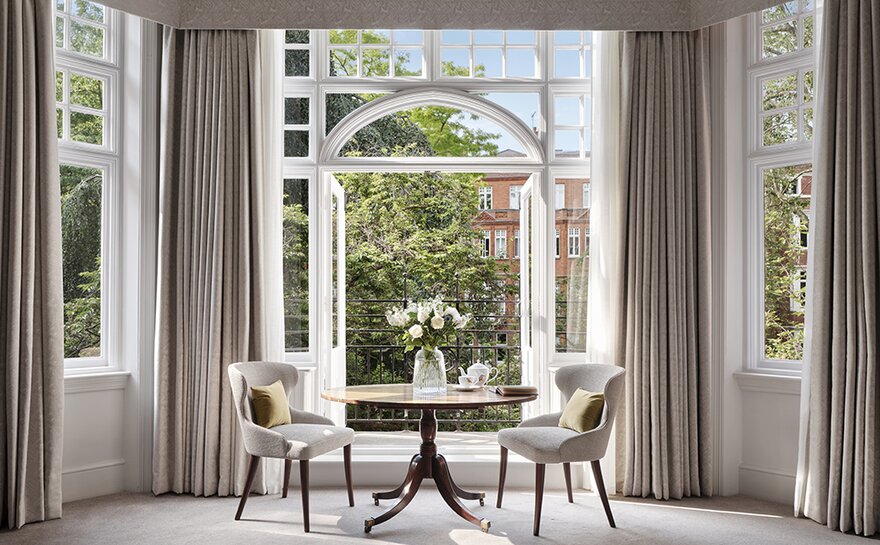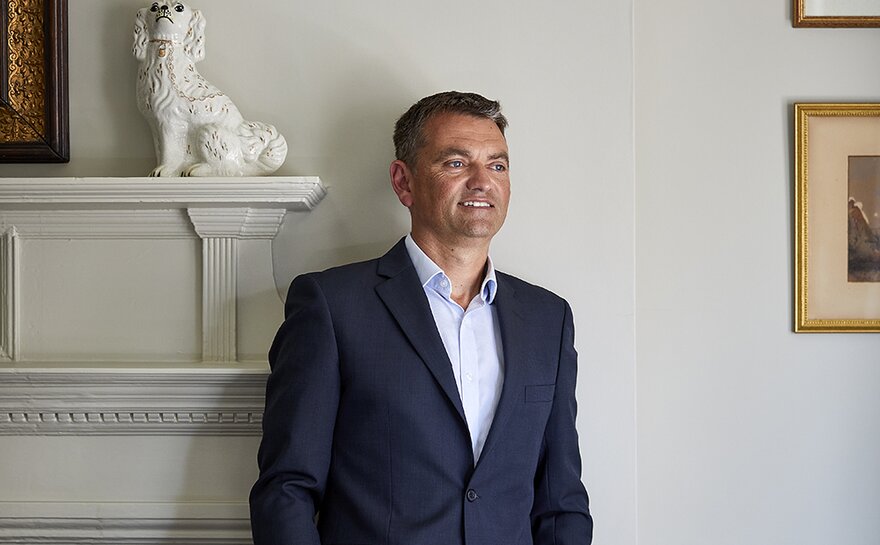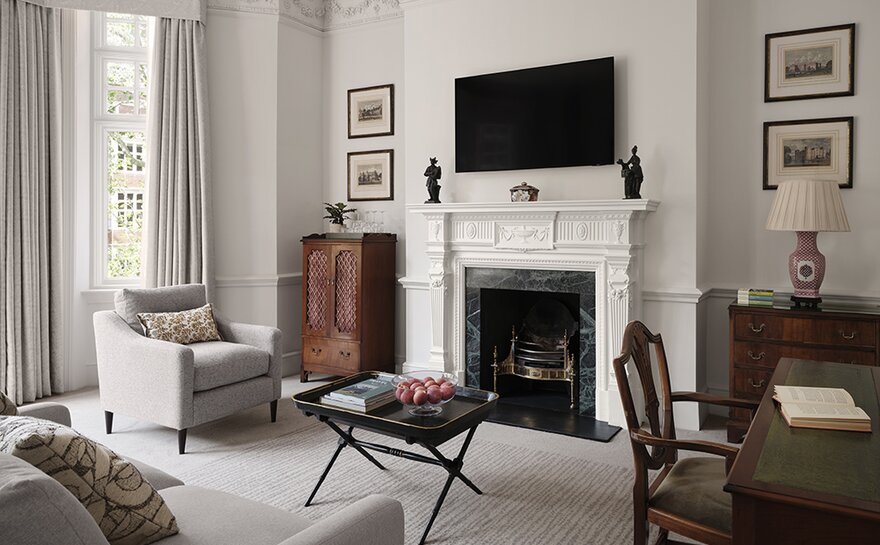Iconic Luxury Hotels is looking to expand with a stable of hotels each as glamorous as its latest opening the Chelsea Townhouse
Executive director Andrew Stembridge is punchy about the future of Iconic Luxury Hotels. Meeting him on the eve of opening its sixth UK hotel, Chelsea Townhouse near London's King's Road (see panel), he is unfazed that a clutch of international players are launching big hotels in the capital. In fact, he announces that Iconic is ready to expand further in the UK.
"Yes, the news is we're opening a new hotel in London when all the big five-star brands – Raffles, the Peninsula and so on – are doing the same. We won't gazump them, but there is no-one in the market doing what we're doing," says Stembridge, pointing out that Iconic draws independent leisure travellers who want history and authenticity.
Growth will come through management contracts and acquisition. In regard to the latter, Iconic's owner L&R has a strong track record and in the current climate can leverage debt, which would be inaccessible for many. "We're lucky because our owner L&R is family-run and cash-rich. It not only has the funds and backing of banks to grow us, but it has amassed hotels across a diverse portfolio, including international assets. This gives us added expertise in acquisitions and a commercial hub that we tap into on the digital side," he says.
Stembridge has been a driving force in Iconic Luxury Hotels' growth, as reflected in his soaring career. In the past 20 years he has risen from managing director at five-red-star Chewton Glen in Hampshire, with a turnover of £10m, to executive director of what is now a collection of six luxury hotels, including Cliveden and the Lygon Arms, with a turnover of £90m-plus and a team of 1,000.
"My desk hasn't moved in 20 years, but over that time it's interesting to look at what we have achieved, the people we have developed and awards we have won," says Stembridge, who was named 2010 Hotelier of the Year.
This year alone group operations director and Cliveden general manager Francisco Macedo won the 2023 Manager of the Year Catey and the collection scooped AA Small Hotel Group of the Year 2023.
Stembridge's first stint at Chewton Glen was as assistant manager in 1997 under its founders Martin and Brigitte Skan. He left to take his first general manager role at the Scotsman, Edinburgh, in 2001 and in 2003 returned to Chewton Glen, which was bought by billionaire property developer Ian Livingstone in 2006. Today, it is part of the Iconic Luxury Hotels collection, which sits within a wider global portfolio of more than 100 hotels owned by L&R, the £9b company that Livingstone founded with his brother, Richard, in 1987.
"At Iconic, we operate in our bubble, but we have an interface with L&R that is supportive," says Stembridge. "We benefit from their knowledge, but we are also agile and pragmatic – the Iconic brand guidelines are loose, so we can react to changes in the market."
On the expansion front, Iconic will also benefit from the fact L&R is always alert to opportunities. Top of the wish list for city sites is that properties must have a minimum of 50 keys and be a good fit for a townhouse concept.
"We're looking at provincial cities with a strong leisure base – purely corporate is wrong for us. That could run into European cities, but our database is largely UK, so if we go international it must be where there is strong demand from the UK," says Stembridge.
Iconic Luxury Hotels' international operations
Outside the UK, Iconic is already operating Venice Excelsior in Italy, which is being refurbished. On the horizon is the Palm Beach hotel, Florida, which, when it comes into the collection will help Iconic tap into the US market. The wish list for sites in the countryside is for "iconic" hotels or "iconic" buildings that could become one.
"Think of Cliveden – it's an icon in itself. Iconic is in the name of the company, so ultimately any property has to reflect that," says Stembridge. "Our hotels are all different, but they are all iconic and the service is the same."
In terms of a growth strategy, Stembridge isn't setting targets. "It forces you to make wrong decisions," he says. "One of the things I love about working with L&R is that it will look at any opportunity but kick tyres in an unemotional manner. It seldom gets it wrong because its due diligence is intensive and robust."
That said, Stembridge envisages 15 hotels across the UK and internationally, though the latter depends on where they can dovetail with L&R's local asset management teams. From a UK perspective, he says: "It's about giving guests who love us more geographical options. But the properties must be commercially successful; not just trophy assets. And we don't want it to become too big because we want to keep in touch with hotels and add value. Operating from a corporate office is not our style."
With management contracts there needs to be synergy and any partnership must enhance the business by adding skills and services. Similarly, the white label branding means Iconic is more open to opportunity. "The Iconic brand is there as a guide," says Stembridge. "With many brands there is no compromise, but we are pragmatic. At Chelsea Townhouse, for instance, half of the bathrooms only have showers, so if our brand standard was to have a bath and shower, we couldn't have taken the management contract on. The world is changing, and we can move with it. It makes scaling difficult because we are not a cookie-cutter operation – but we do have a blueprint for our systems."
Does Iconic have its eye on any hotels in the wider L&R portfolio? "Yes, unquestionably. There are hotels in the portfolio we'd love to get our hands on," says Stembridge. "I'm convinced we'll end up finding two or three properties at once and that will stretch us, but we have the right team. We have an agile and dynamic senior team supported by a strong commercial team and a central reservations team of 50 people. So, it's exciting times."
What about the London market? Is there room in the capital for more? "Yes, I think so," says Stembridge. "Iconic is not looking in London, though we would consider the right property. But L&R will always be interested in London and owns and operates Strand Palace and owns Hilton on Park Lane.
"Demand from the international market has bounced back and is 100% propping London up," says Stembridge. "In addition, post-pandemic a lot of hotels have learned to operate more efficiently. They are looking at revenue per available room rather than purely at occupancy, and recognise that being ‘full' isn't always best. Around the pandemic, hotels were running on lower occupancy, and they've learned to hold their nerve because dropping the rate doesn't drive more business."
Stembridge says the bedrock of Iconic's success has been through developing its people and fostering a happy and supportive work environment. This was demonstrated when Macedo won the 2023 Manager of the Year Catey. Despite all the challenges in the industry, he retained almost 70% of his team in 2022.
Iconic Luxury Hotels as a brand
The brand name Iconic Luxury Hotels launched in December 2016 when the collection had reached four hotels, some 10 years after L&R acquired its first property, the 72-bedroom Chewton Glen. In 2012, following the collapse of the Von Essen empire, L&R saw a good fit in its five-star 48-bedroom Cliveden in Berkshire, acquiring a long lease from freehold owner the National Trust for nearly £30m. The team then acquired and relaunched the 78-bedroom Lygon Arms in the Cotswolds in 2016 and soon afterwards Cadogan Estates awarded them the management contract at 11 Cadogan Gardens in Chelsea.
"We'd jumped from two hotels to four and had a commercial hub," says Stembridge. "We needed to formalise it and came up with the idea of Iconic Luxury Hotels. Since then, we've been looking at synergies across HR, reservations, purchasing, environmental, social and corporate governance, and compliance."
While the branding remains largely white label, it is evolving. In December 2020 during the pandemic, Iconic made a bold move in opening the 172-bedroom Mayfair Townhouse.
"Industry colleagues said we were crazy without a brand, but we nudged the market with our Iconic database. This proved there is a lot of equity in our database and more brand awareness than we'd imagined," says Stembridge.
"When we first created Iconic it was about the engine room stuff. Iconic was signed up by Cadogan Estate as a white label operator at 11 so we never intended to get the limelight, but what we found with Mayfair Townhouse was that it needed that endorsement. It was first time we put branding outside the door and that has powered the brand even more."
It gave the team confidence that as an operator they can bring a lot to the table. "We are white-label-plus-plus. It's not about hanging the Iconic banner outside the door; it's about introducing people to the Iconic family. We're able to be more flexible and pragmatic," says Stembridge.
Subsequently, Iconic opened the Apartments by 11 Cadogan Gardens in April 2021, and now Chelsea Townhouse.
For now, Stembridge describes the Iconic platform as being a business to business tool that is useful at trade shows and cross-selling across venues through central reservations. But as the brand expands, he says: "We feel our way and where the brand adds value, we use it. At Cliveden, there would be no need to add Iconic, for instance."
About the Chelsea Townhouse
The opening of the 36-bedroom Chelsea Townhouse hotel near London's King's Road feels like a gear-change for Iconic Luxury Hotels. It marks the brand's third hotel in London and its location around the corner from 56-bedroom 11 Cadogan Gardens, with its additional six apartments, has created a mini-hub and "a super GM" in the shape of Ian Richardson, who is now general manager across what is now being called the Cadogan Gardens Collection. The "hub", however, does not include the third London hotel, the 172-bedroom Mayfair Townhouse on Green Park.
"We've now got 98 keys across the two hotels and the apartments, so it makes commercial sense. It is exciting to have a core of properties serving three different market segments," says Richardson, adding that another benefit is that employees can be rotated according to peaks and troughs, sick leave and so on, which in turn cross-fertilises expertise and encourages retention.
Chelsea Townhouse, which comprises three Victorian townhouses overlooking the private Cadogan Gardens, was formerly the Draycott hotel. Its owner, Mantis Collection, sold it to the Cadogan Estate last November. Cadogan then appointed Iconic, which already operates 11 Cadogan on its behalf, to oversee its transformation and manage it.
"We've made big changes. All the chintz is gone, and we've moved the F&B to the ground floor from the dark basement," says executive director Andrew Stembridge.
The hotels complement each other.
Whereas 11 Cadogan is a boutique hotel that "feels very clubby", the Chelsea Townhouse has larger rooms and original architectural features, but with only 36 bedrooms it allows for more familiarity and personal service.
Positioning wise, Chelsea is a step up from 11 Cadogan and much closer to its neighbour the Cadogan hotel, by Belmond, also owned by Cadogan. In fact, bookings are already vigorous at Chelsea, which offers four room categories – Deluxe, Junior suite, Garden suite and six Cosy rooms – with rates starting at £299 for Cosy rising to £560 for a Garden suite.
"The Chelsea Townhouse is already gaining strong traction in the market, and we have been surprised about where some of our guests have moved from to try the hotel. This has reinforced how unique the offer is, especially when you add in the exceptionally quiet and leafy location," says Richardson.
Stembridge and Richardson's mantra is to create a home from home, so guests will arrive at the main door, but once checked in they can come and go by any of the three doors.
"People want to be independent," says Stembridge, "They don't want to interact with hotel staff every time they return."
The all-day menu offers home-style comfort food, such as club sandwiches and lobster rolls, and guests can order from any member of staff and eat where they fancy – even in the Library. "In all our hotels you can sit where you want and we will find you, but here it is more pronounced," says Stembridge, who adds that Iconic's London properties have a different take on hotel restaurants and expect people to want to eat out in the capital.
For Stembridge, it is this unstuffy style of service that differentiates Iconic from many top London hotels: "There is either a lot of service where you don't feel worthy, or it is anonymous. We encourage personalities and friendliness. We look at the audience and celebrate differences."
The interior design is a blend of period features and contemporary touches. In a happy twist, one of the townhouses was the London bolthole of Cliveden's original aristocratic owners so many of the paintings and antiques came with the sale. But the "busyness" has gone, and a fresh neutral palate has been introduced with new soft furnishings, Harrison Spinks beds and sofabeds for the family market.
There is certainly a calm, cool feeling in all the rooms, some of which are sunlit by floor-to-ceiling windows, another has a balcony overlooking the communal gardens.
"It's fundamental that a good hotel offers guests a good night's sleep," says Stembridge, who insisted that all rooms have clock radios so guests can fall asleep listening to them and wake up gently. And always erring towards generosity, the minibars – concealed in period cabinets – offer free goodies. "It's the little things," he says.
Technology at Chelsea Townhouse is cutting-edge but unobtrusive. Richardson notes that at 11 Cadogan only 3% of guests are corporate, but says blended leisure and business is a key target market. "We will attract guests who are more discerning and want a nice environment to work in, so the property will suit the US market."
Chelsea Townhouse is also expected to become a member of Relais & Chateaux, joining 11 Cadogan, which is the only member in London.
"That's a coup," says Richardson. "It drives a lot of business – about £300,000 this year – and it draws a strong US component".
Stembridge adds: "That is business directly attributable to Relais, but they steer bookings to the hotel, so it could be three or four times more than that."







